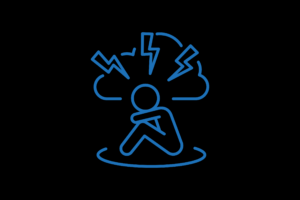Rejection Sensitivity Dysphoria is often thought of as someone being overly sensitive to rejection, like it’s the person that needs to toughen up and learn to accept a bit of criticism.
But Rejection Sensitivity can feel like physical pain from the criticism or comment at the time, even if it wasn’t intended.
This pain usually comes from reliving previous rejections, as they all stack up.
When you were younger you might have heard:
- You’re such a lazy-bones!
- You’re always late!
- You’re a messy-pup!
- You’re such a wriggle-bum!
- Do you ever stop talking?
- Stop being silly!
All of these criticisms mount up, take up space inside our head and cause us to have low self-esteem.
Other people might be able to shake off a negative comment but autistic people are more likely to think about what was said and replay the whole interaction, overthinking every detail. This makes us feel bad about ourselves. Then when someone starts to criticise us or we think they are about to, we sense it coming and reject ourselves – even if there was no rejection intended.
Here are 2 common situations where RSD can get in the way of friendships:
- If friends say you should hang out, unless they explicitly invite you, you might assume they don’t want you there. Your brain can trick you into thinking they haven’t included you if they haven’t used the right wording for you to feel wanted. Talk to friends and ask that they invite you or make you feel included, explicitly.
- If you haven’t heard from a friend for a while, instead of thinking they might be busy or have a lot on, your brain can think they don’t like you anymore, or you are a burden and they are deliberately not talking to you. These things aren’t usually true, but your brain is tricking you again, Rejection Sensitivity Dysphoria lies to you because rejection has stacked up and allowed those intrusive thoughts to leap into your head. One way to counteract this is by reaching out to your friend by sending a gif, a meme or a reel, and it can help you start chatting again.
Once you know that you struggle with Rejection Sensitivity Dysphoria try to let those around you know – your friends, family, school or college. Ask people to change the way they give you feedback – maybe some extra reassurance would help, or you might know of something that works for you. Don’t be afraid to tell people when your RSD is kicking in and a situation is overwhelming. It’s good to advocate for yourself and say when you’re not OK.




